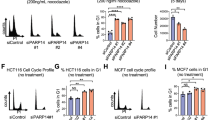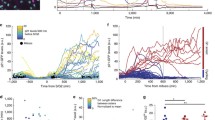Abstract
A unique feature of p21 that distinguishes it from the other cyclin-dependent kinase (CDK) inhibitors is its ability to associate with the proliferating cell nuclear antigen (PCNA), an auxiliary factor for DNA polymerases δ and ε. While it is now well established that inhibition of cyclin/CDK complexes by p21 can result in G1 cell cycle arrest, the consequences of p21/PCNA interaction on cell cycle progression have not yet been determined. Here, we show, using a tetracycline-regulated system, that expression of wild-type p21 in p53-deficient DLD1 human colon cancer cells inhibits DNA synthesis and causes G1 and G2 cell cycle arrest. Similar effects are observed in cells expressing p21CDK−, a mutant impaired in the interaction with CDKs, but not in cells expressing p21PCNA−, a mutant deficient for the interaction with PCNA. Analysis of cells treated with a p21-derived PCNA-binding peptide provides additional evidence that the growth inhibitory effects of p21 and p21CDK− result from their ability to bind to PCNA. Our results suggest that p21 might inhibit cell cycle progression by two independent mechanisms, inhibition of cyclin/CDK complexes, and inhibition of PCNA function resulting in both G1 and G2 arrest.
Similar content being viewed by others
Author information
Authors and Affiliations
Rights and permissions
About this article
Cite this article
Cayrol, C., Knibiehler, M. & Ducommun, B. p21 binding to PCNA causes G1 and G2 cell cycle arrest in p53-deficient cells. Oncogene 16, 311–320 (1998). https://doi.org/10.1038/sj.onc.1201543
Received:
Revised:
Accepted:
Published:
Issue Date:
DOI: https://doi.org/10.1038/sj.onc.1201543
- Springer Nature Limited
Keywords
This article is cited by
-
Integrative modeling uncovers p21-driven drug resistance and prioritizes therapies for PIK3CA-mutant breast cancer
npj Precision Oncology (2024)
-
Strategic Approaches to Improvise Peptide Drugs as Next Generation Therapeutics
International Journal of Peptide Research and Therapeutics (2023)
-
Anti-cancer peptide-based therapeutic strategies in solid tumors
Cellular & Molecular Biology Letters (2022)
-
Temporal and spatial topography of cell proliferation in cancer
Nature Cell Biology (2022)
-
The microRNA cluster C19MC confers differentiation potential into trophoblast lineages upon human pluripotent stem cells
Nature Communications (2022)




